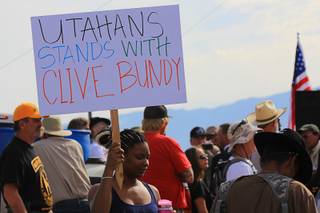
John Locher / AP
Marie Ries, center, marches with others in support of defendants on trial in federal court, Wednesday, April 12, 2017, in Las Vegas. The six men were accused of wielding weapons to stop federal agents from rounding up cattle near Nevada rancher Cliven Bundy’s property in 2014.
Published Thursday, April 13, 2017 | 2:17 p.m.
Updated Thursday, April 13, 2017 | 6:12 p.m.
A federal jury in Las Vegas began deliberating Thursday in the first of three trials stemming from an armed standoff that stopped federal agents from rounding up cattle near state's rights advocate Cliven Bundy's ranch three years ago.
After two months of testimony and a day and a half of closing arguments, jurors were expected to spend several days weighing evidence before delivering verdicts. Six defendants face 10 counts each, including threatening and assault on a federal officer, obstruction, extortion, weapon violations and conspiracy.
The tense April 12, 2014, standoff wasn't about First Amendment free speech or the Second Amendment right to bear firearms, Acting Nevada U.S. Attorney Steven Myhre said.
It was about defendants who arrived in southern Nevada from Idaho, Arizona and Montana with assault-style rifles to answer a Bundy family call-to-arms, and the threat the prosecutor said they posed to federal agents enforcing two court orders to get Bundy cows off public land.
Any reasonable person would see the weapons openly "carried, used and brandished" as a threat, Myhre said.
"They're being used to intimidate. They're part of a show of force," and U.S. Bureau of Land Management and National Park Service agents who testified in the case "thought they were going to die."
"You can say what's on your mind," Myhre said of the protesters, "but you can't level a threat to somebody."
As he spoke, defendants' supporters and Bundy family matriarch Carol Bundy got up one by one and left the courtroom gallery to join a flag-waving rally that has been in front of the U.S. courthouse every day since trial began in early February.
Carol Bundy said the protest was to show they feel the trial has unfairly favored the prosecution.
"This whole stand was about overreach of the government, and they're still doing it today," she said.
Defense attorneys told the jury the government didn't prove conspiracy or any other charges against defendants Scott Drexler, Todd Engel, Eric Parker and Steven Stewart of Idaho, Gregory Burleson of Arizona, and Richard Lovelien. He lived in Oklahoma but said he was part of a group called the Montana Defense Force.
Each could face mandatory sentences of more than 50 years in prison if they are found guilty of crimes of violence, and more than 100 years on all charges.
Drexler "went to help, to protest, like hundreds of people," defense attorney Todd Leventhal said of his client, who arrived with Parker and Stewart just hours before the standoff after hearing that Bundy family members had been knocked down, hit with stun gun darts and arrested in earlier confrontations with federal agents.
Agents demanded the crowd disperse, before the local sheriff brokered a truce and the cows were released.
The trial represents the latest turn in a long-running dispute over land policy in the U.S., where states' rights advocates want to wrest federal control of vast tracts of public land in Western states.
A second federal trial could start June 5 for Cliven Bundy, his sons Ammon and Ryan Bundy, and two other defendants characterized by prosecutors as leaders of a conspiracy. Trial for another six defendants would follow in the fall.

